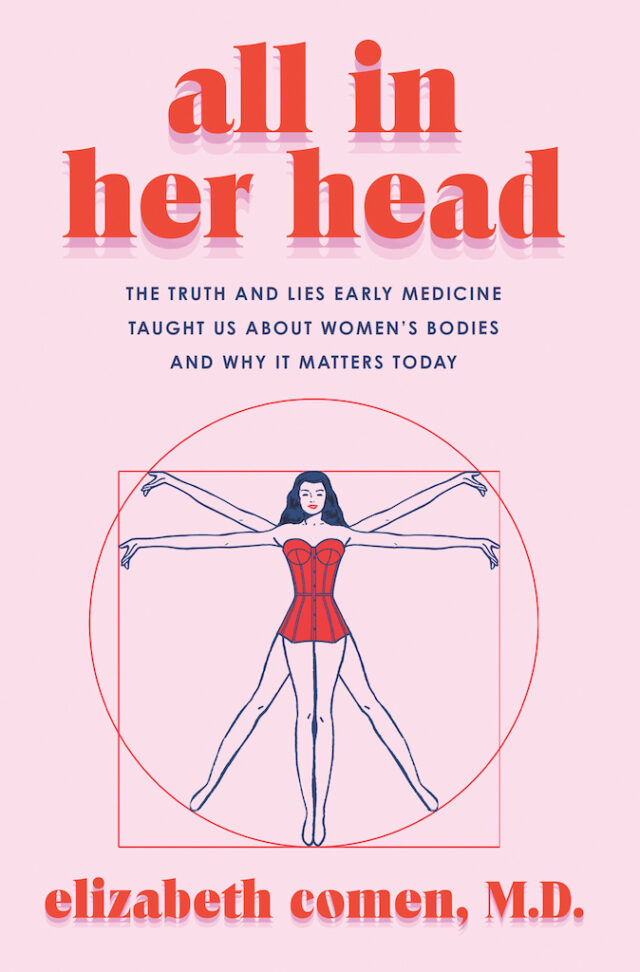
By Annelise Peterson
In the groundbreaking new book, All in Her Head: The Truths and Lies Early Medicine Taught Us About Women’s Bodies and Why It Matters Today, Elizabeth Comen, M.D., boldly tackles centuries of patriarchal narratives that have disregarded, shamed and even mutilated women’s bodies, minds and spirits. With piercing insight, Comen dissects entrenched systemic biases that continue to shape our understanding of women’s health, underscoring the urgency to take agency over a medical system that has neglected and misunderstood the innate mystery and power of the female form.
Comen’s resume includes a Bachelor of Arts in the history of science from Harvard College; she obtained a Doctor of Medicine degree from Harvard Medical School. She further refined her expertise through a residency in internal medicine at Mount Sinai Hospital and a fellowship in oncology at the Memorial Sloan Kettering Cancer Center. Recognized internationally for her outstanding contributions as a physician-scientist and an advocate for women’s health, Comen works as a medical oncologist with a specialty in breast cancer at Memorial Sloan Kettering Cancer Center while holding the esteemed position of assistant professor of medicine at Weill Cornell Medical College. This academic pedigree empowers Comen to address historical oversights and inequities within modern medicine with the same, or perhaps even greater, authority as her male colleagues. Patient experiences alone fail to make women’s medical complaints credible in a system that overlooks the intricate differences in the female body, fixating solely on breasts and reproductive organs—a phenomenon Comen labels “bikini medicine.” She writes: “No other illness stokes our fears the way cancer does…But the emotion I encounter most in the examination room, more potent and insidious than fear, is shame.”
Through her systematic exploration of each of the 11 organ systems of a female’s body, Comen utilizes humor and unapologetic historical truth to unveil just how little is genuinely known about the inner workings of a body that houses a uterus and blossoms a clitoris.
“Women are 80 percent more likely to suffer from autoimmune disorders than men, for reasons that scientists have yet to understand,” states Comen. “In most cases, these gender disparities are acknowledged but never studied; doctors have long been prone to writing off the differences as hormonal without further inquiry.”

According to speaker and author Gabor Maté, M.D., hailed for his expertise on trauma, addiction, stress and childhood development, overrepresented autoimmune disorders like multiple sclerosis result from a woman’s suppression of anger. “This is just another story that perpetuates the blame,” affirms Comen. Upon examination of the historical treatment of “hysterical” women, perhaps suppression was the only means to survive a system malignantly steeped in pathological patriarchy: “Soon, doctors were in general agreement that hysteria in women was a function of this innate inferiority, one brought on by their attempting to somehow subvert the passive, domestic, subservient role that was a woman’s biological destiny,” writes Comen.
Women, as the bearers of life, hold immense power. Through the groundbreaking endeavors of pioneers like Elizabeth Comen, the opportunity unfolds to reimagine a medical system that currently reveres Leonardo da Vinci’s Vitruvian Man as the ideal. In the dawn of time, there may have existed a girl named Eve, or Elizabeth, or perhaps it was you. Before this girl was molded to believe she was fashioned from a man’s rib, she knew herself as inherently perfect. Her body was a thing of beauty. Her mind was curious, thirsting for knowledge. She saw herself as complete, without the need for validation from a man to feel powerful or worthy. Before the concept of hierarchy or a divine male father figure, perhaps there existed a woman who loved herself fiercely. Her body was her sanctuary. drelizabethcomen.com





